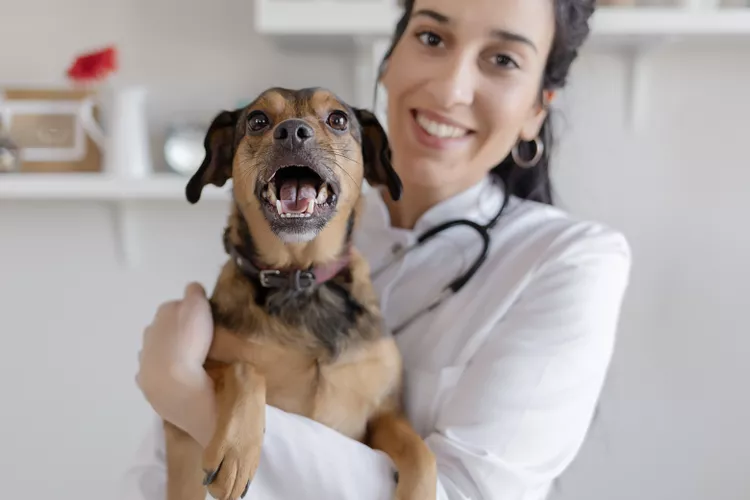Everything to Know About the Kennel Cough Vaccine

You have probably heard of kennel cough in dogs, but did you know that there is a vaccine for it? Vets commonly refer to this simply as the Bordetella vaccine and recommend it annually for the majority of dogs.
What is the Kennel Cough Vaccine?
Kennel cough is a basic term used to describe canine infectious tracheobronchitis, an infectious respiratory disease that affects dogs. Kennel cough causes a hacking cough that can last for days to weeks. Most cases resolve with little to no treatment, but others can come severe and lead to pneumonia. Kennel cough is highly contagious and can quickly spread among dogs in close quarters, such as kennels and dog parks. Dogs contract kennel cough either by exposure to an infected dog or exposure to a contaminated surface or object.
There are many types of pathogens that can cause canine infectious tracheobronchitis. Most cases of kennel cough are caused by a combination of pathogens. Fortunately, there are vaccines available for the most common of these.
- Adenovirus type 2
- Parainfluenza (virus)
- Bordetella bronchiseptica (bacteria)
The DA2PP vaccine provides immunization against adenovirus type 2 and parainfluenza. A separate vaccine is available to immunize against Bordetella bronchiseptica. This vaccine is often referred to simply as "Bordetella" and may be abbreviated as "Bord" in your dog's records.
Bordetella Vaccine
The Bordetella vaccine is available in three forms categorized by the route of administration.
- Intranasal: administered directly into the nasal passages (no needle); usually includes immunization against parainfluenza, and some products protect against adenovirus as well
- Intraoral: administered directly into the mouth by the cheek (no needle)
- Parenteral/Injectable: injected under the skin, typically along the back
Most veterinarians recommend the intranasal or intraoral forms over the injectable version because they offer better protection against Bordetella. Many vets reserve the injectable vaccine only for dogs with aggression or extreme aversion to having their faces touched. There is some debate about the intranasal efficacy compared with the intraoral. Some vets prefer the intranasal form because of the additional protection against other agents that can cause kennel cough. Evidence suggests that, while both the intranasal and intraoral vaccines are effective, the intranasal may offer better protection.
Dogs immunized with the Bordetella vaccine can still get kennel cough because of the variety of pathogens that cause the disease. However, vaccination reduces the severity of kennel cough and helps prevents its spread.
Do All Dogs Need the Kennel Cough Vaccine?
Bordetella is considered a non-core vaccine by the American Animal Hospital Association, meaning it may be recommended depending on the dog's lifestyle.
In general, any dog that spends a lot of time around other dogs should get the Bordetella vaccine. This vaccine is required by most boarding facilities, groomers, dog show rings, dog training facilities, and doggy daycare centers to prevent outbreaks.
There is a significantly reduced likelihood of kennel cough exposure in dogs that do not come into contact with dogs outside the household. While these dogs can still get kennel cough through accidental exposure, they are unlikely to spread it due to their lifestyles.
Your veterinarian will discuss your dog's lifestyle with you and help you make an informed decision about your dog's vaccinations.
When to Vaccinate
The Bordetella vaccine is typically part of the puppy vaccination schedule for puppies. It is recommended for most puppies so they will have protection when they start going to puppy classes, dog parks, and other places for socialization.
Most veterinarians recommend the first intranasal or intraoral Bordetella vaccine between eight and 14 weeks of age. The initial vaccine may need to be repeated within two to four weeks for full immunization, depending on the age of the puppy at the time of vaccination and the type of vaccine used.
After the initial puppy vaccines, a Bordetella booster should be given annually, though it may be used up to every 6 months in certain high-risk scenarios..
Possible Side Effects
Every vaccine has potential side effects, but veterinarians agree that the benefits of vaccines outweigh the risks in most cases. Vaccines typically have self-limiting effects. They can cause lethargy, poor appetite, and minor pain and/or swelling at the site of injection. These effects tend to resolve within one or two days.
Vaccines should not be given to a dog with a fever. In general, a sick dog should not be vaccinated until fully recovered from illness. Vaccines are typically avoided in any dog with a history of immune-mediated disease because they may cause the dog to become sick.
Vaccine Reactions
Vaccine reactions are uncommon and generally occur within 15-30 minutes of injection. Signs include vomiting, diarrhea, seizures, trouble breathing, facial swelling, and collapse. Bring your dog back to the vet immediately if you notice any of these signs.
Long-Term Effects
Little evidence exists for potential long-term side effects of the kennel cough vaccine for dogs. In general, overvaccination has been associated with an increased risk of autoimmune disease in dogs. However, current vaccine protocols are developed with a goal to reduce overvaccination. Most dogs experience no long-term effects from immunizations.